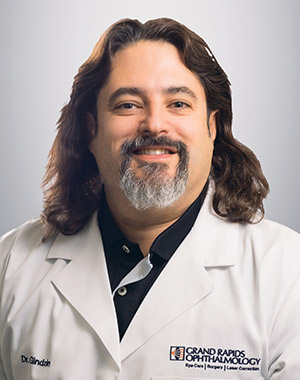Do You Have Diabetes?
If yes, you are at a higher risk of developing diabetic retinopathy, cataracts, and glaucoma. To decrease the chances of these eye diseases, make sure to follow these guidelines:
- Get a dilated eye exam from your eye care doctor once a year
- Control your blood pressure and cholesterol levels
- Control your blood sugar
- Exercise
- Do not smoke
What is Diabetes?
Diabetes affects your body’s ability to produce insulin or use it effectively. High blood sugar can damage many parts of the body, including the eye. Diabetic eye disease encompasses several eye problems:
- Diabetic retinopathy: Diabetic retinopathy is when blood vessels in the retina leak, swell or close off completely. Abnormal new blood can also grow on the surface of the retina. The risk of diabetic retinopathy increases the longer you have diabetes).
- Diabetes and cataracts: High blood sugar can cause cataracts. Controlling your blood sugar helps prevent cataracts. If your lenses are clouded by the affects of diabetes, our cataract surgeons have options for you.
- Diabetes and glaucoma: Having diabetes doubles your chances of having glaucoma. Untreated glaucoma can lead to irreversible loss of vision.
How Can You Tell if Diabetes is Affecting Your Eyes?
High blood sugar can negatively affect your eyes and every part of your body. Blurry vision can be one of the first warning signs of diabetes. Your vision becomes blurry if fluid leaks into the lens of your eye. This fluid makes your lens swell and change shape, causing blurry vision.
How Often Should Diabetics Have Their Eyes Checked?
Studies from the Centers for Disease Control and Prevention (CDC) studies show that 60% of diabetics are not getting the exams their doctors recommend. If you’ve recently been diagnosed with Type 2 Diabetes, you should have an eye exam right away. All diabetics should have an eye exam at least once a year.
Other ways to combat diabetic eye diseases include:
- Control your blood pressure and cholesterol levels.
- Control your blood sugar
- Exercise
- Do not smoke
The doctors at Grand Rapids Ophthalmology are experts at providing diabetic eye exams. If there is a need for treatment, Drs. Gindzin and Gohel are our retinal specialists, and use the most advanced technology available, including lasers, for diabetic eye disease treatments.
Schedule an Appointment
Schedule an appointment today to experience the GRO difference. Call 616.588.6598 or click here.























